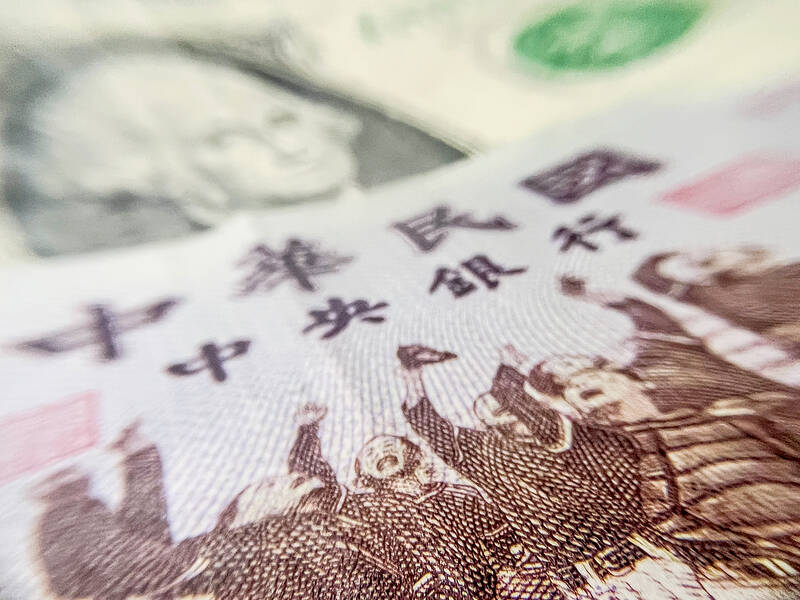The New Taiwan dollar dropped more than 5 percent against the US dollar in the first half of this year, even as Taiwan sold a net US$9.06 billion to stabilize the exchange rate, the central bank said yesterday.
In a report submitted to the legislature, the central bank said that the factors acting on Taiwan’s foreign exchange market in the first half mainly originated in the US, including the continued resilience of the US economy, delayed and smaller-than-expected interest rate reductions by the US Federal Reserve, and increases in US bond yields and the US dollar index.
During the first six months of this year, Taiwan’s foreign exchange market experienced excess demand for US dollars, driving the NT dollar down 5.29 percent and prompting the central bank to intervene by selling a net US$9.06 billion to bolster the local currency, the report said.

Photo: CNA
By comparison, the central bank sold a net US$2.77 billion in the foreign exchange market over the whole of last year, during which the NT dollar fell by 0.09 percent.
Despite its depreciation, the NT dollar’s performance from Jan. 1 to Monday — a 4.45 percent drop against the US dollar — was better than that of the won and yen, which fell by 5.2 percent and 5.82 percent respectively, the central bank said.
The NT dollar rose against the US dollar yesterday, advancing NT$0.005 to close at NT$32.175 in Taipei trading.
Central bank Governor Yang Chin-long (楊金龍) is scheduled to brief the Legislative Yuan’s Finance Committee on the report today.

When an apartment comes up for rent in Germany’s big cities, hundreds of prospective tenants often queue down the street to view it, but the acute shortage of affordable housing is getting scant attention ahead of today’s snap general election. “Housing is one of the main problems for people, but nobody talks about it, nobody takes it seriously,” said Andreas Ibel, president of Build Europe, an association representing housing developers. Migration and the sluggish economy top the list of voters’ concerns, but analysts say housing policy fails to break through as returns on investment take time to register, making the

‘SILVER LINING’: Although the news caused TSMC to fall on the local market, an analyst said that as tariffs are not set to go into effect until April, there is still time for negotiations US President Donald Trump on Tuesday said that he would likely impose tariffs on semiconductor, automobile and pharmaceutical imports of about 25 percent, with an announcement coming as soon as April 2 in a move that would represent a dramatic widening of the US leader’s trade war. “I probably will tell you that on April 2, but it’ll be in the neighborhood of 25 percent,” Trump told reporters at his Mar-a-Lago club when asked about his plan for auto tariffs. Asked about similar levies on pharmaceutical drugs and semiconductors, the president said that “it’ll be 25 percent and higher, and it’ll

NOT TO WORRY: Some people are concerned funds might continue moving out of the country, but the central bank said financial account outflows are not unusual in Taiwan Taiwan’s outbound investments hit a new high last year due to investments made by contract chipmaker Taiwan Semiconductor Manufacturing Co (TSMC, 台積電) and other major manufacturers to boost global expansion, the central bank said on Thursday. The net increase in outbound investments last year reached a record US$21.05 billion, while the net increase in outbound investments by Taiwanese residents reached a record US$31.98 billion, central bank data showed. Chen Fei-wen (陳斐紋), deputy director of the central bank’s Department of Economic Research, said the increase was largely due to TSMC’s efforts to expand production in the US and Japan. Investments by Vanguard International

WARNING SHOT: The US president has threatened to impose 25 percent tariffs on all imported vehicles, and similar or higher duties on pharmaceuticals and semiconductors US President Donald Trump on Wednesday suggested that a trade deal with China was “possible” — a key target in the US leader’s tariffs policy. The US in 2020 had already agreed to “a great trade deal with China” and a new deal was “possible,” Trump said. Trump said he expected Chinese President Xi Jinping (習近平) to visit the US, without giving a timeline for his trip. Trump also said that he was talking to China about TikTok, as the US seeks to broker a sale of the popular app owned by Chinese firm ByteDance Ltd (字節跳動). Trump last week said that he had